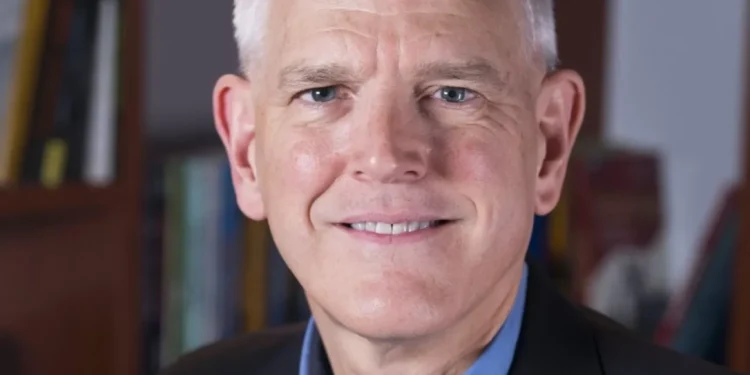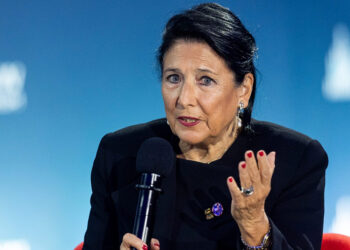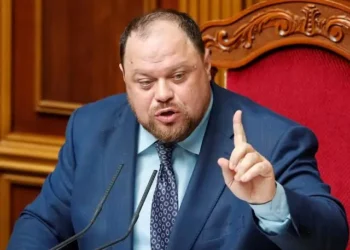Interview by Vazha Tavberidze
This is Putin’s neo-imperialist war, aimed at recovering parts of the Russian Empire lost with the Soviet collapse in 1991, – warns Ambassador Steven Pifer, former US ambassador to Ukraine and one of the chief American negotiators of the original Budapest Memorandum. In a wide-ranging interview with RFE/RL’s Georgian Service, Pifer calls the Alaska summit between Donald Trump and Vladimir Putin a “debacle,” criticizes Washington for failing to apply real pressure on the Kremlin, and warns against a repeat of the Budapest-style assurances. He argues that Ukraine will not — and should not — accept a settlement without ironclad Western security guarantees, including hundreds of fighter jets, to ensure the war does not simply pause before Moscow strikes again. Pifer also cautions that Putin’s imperial ambitions may extend beyond Ukraine, threatening Moldova, Georgia, Armenia, Azerbaijan, and Kazakhstan: “If Russia prevails, all of them will come under significant pressure,” he says.
Where do we stand right now with President Trump’s peace efforts? What exactly did the Alaska and Washington meetings show us, and how close did they bring us to peace?
I would say Alaska, unfortunately, was a debacle. President Trump went there saying his goal was to get Putin to agree to a ceasefire. He also said that if Putin did not agree, there would be severe consequences. Well, Putin did not agree to a ceasefire, there were no consequences, and instead the two ended up discussing a Russian proposal filled with poison pills that would be completely unacceptable to Ukraine. So that was a setback if you’re looking at any serious effort to build peace.
The discussions in Washington between President Trump, President Zelensky, and seven other European leaders helped recover some of that damage. There was a conversation about security guarantees, and President Trump suggested that while there would be no US boots on the ground, American air power might be involved. I think that helped repair some of the damage, but it remains very clear — from what Moscow has been saying recently — that the two sides are still very, very far apart.
The latest Russian demands include having a veto over Ukraine’s security guarantees, and bringing China into the process. What kind of security guarantees are we talking about?
Vladimir Putin is prepared to accept a peace agreement, but only on Vladimir Putin’s terms — and those terms amount to Ukraine’s capitulation. It’s no surprise that Ukraine says no. As for Foreign Minister Lavrov’s take on guarantees, that Russia should have a vetoing power — genuine security guarantees have to be between Western countries and Ukraine. Russia doesn’t have a role here.
Remember: back in Istanbul in 2022, the Russians suggested security guarantees where Russia itself would be one of the guarantors. But under their proposal, all guarantors had to agree before acting — which would have allowed Russia to invade Ukraine, then veto any collective response. It should not surprise the Russians that there is no interest in such a proposal, not in Ukraine and not in the West.
What about the concession President Putin was ready to make, according to Special Envoy Witkoff?
We don’t know. Maybe Putin suggested freezing the lines in Zaporizhzhia and Kherson, but I’ve seen nothing to indicate that Russia has abandoned its claim to all of Kherson and Zaporizhzhia.
The most ludicrous part of the Russian proposal in Alaska was that Ukraine would abandon all of Donetsk — and that was just the entry price to begin negotiations. That would have left Russia positioned to walk away after two or three weeks, declare the talks a failure, and resume the war. Meanwhile, Ukraine would have already handed over the defensive fortifications that have stopped Russia from taking Donetsk for three years. I was a little disappointed the Americans didn’t see that trap when they were talking to Putin in Alaska.
There was too much talk about land swaps. Land swaps are really just land concessions by Ukraine. If you look at what Ukrainians themselves have said, they may be prepared to accept some kind of temporary occupation, in fact, in 2024, President Zelensky said Ukraine might agree not to use military force to retake occupied territory. That creates the possibility that — in a final settlement — Ukraine could agree to tolerate temporary occupation of some of its land, without recognizing it internationally. But I don’t think Ukrainians should even be asked to contemplate that unless there are real security guarantees in place, guarantees that give them confidence that Russia won’t simply invade again two years later.
And in the unlikely event that those guarantees materialize, wouldn’t it be completely counterintuitive for Russia to accept them?
That’s exactly the other side of the coin. And here, unfortunately, President Trump has not played some of the high-value cards he actually has. For three or four months now, he’s been threatening new economic sanctions on Russia — but never imposed them. So there’s been no new economic pressure. More importantly, he hasn’t played the cards that would put real military pressure on Russia: namely, making it clear to the Kremlin that Ukraine will have the resources and weapons it needs for 3, 4, 5, 6 years. Right now, Putin believes he can achieve his goals on the battlefield. What Trump should be doing is making clear that Putin will fail, and that the costs of trying will only keep rising.
That means seizing Russia’s frozen central bank assets, asking Congress for more money for Ukraine, making it clear Ukraine’s military will be sustained in the field for the long haul. Only then might the Kremlin start to wonder: do we really want 2, 3, 4 more years of this? That’s what pressure looks like. Unfortunately, so far, Mr. Trump has shown no willingness to apply it.
Wouldn’t that also need to be part of a larger strategy — one that ensures Ukraine continues receiving this kind of support even after the war is over?
Absolutely. There should be a package of guarantees, and one of them must be a Western commitment to help Ukraine build and sustain a powerful military. And I’m not talking about 40 F-16s. I’m talking 300 or 400 F-16s, so that Ukraine is so strong militarily that Russia says: we don’t want to try this again. That is the best security guarantee — Ukraine armed to the teeth. But yes, additional Western guarantees could and should further strengthen that.
Europe also seems indecisive — this ‘coalition of the willing’ can’t decide on boots on the ground. Some even warn of a ‘Budapest 2.0,’ where the West again offers vague assurances instead of guarantees, as with the first memorandum you helped draft. How likely is that scenario?
The Budapest Memorandum was negotiated in a very different time, back in 1993–94, and with a very different Russia. Boris Yeltsin had plenty of flaws, but he fundamentally accepted Ukraine’s territorial integrity and respected its sovereignty. If there was an oversight, it was ours — by ours, I mean Washington’s and our Ukrainian counterparts’. We did not foresee what Vladimir Putin would do in 2014 or again in 2022. Had Ukrainians seen that as even a distinct probability, the arrangement would never have gone through. There was genuine hope then — ultimately unrealized — that Russia was moving toward a more democratic system, however flawed, and toward a market economy, and that it might evolve in a different direction. Unfortunately, once Putin became president, he reversed those trends. Today’s Russia looks far more like the Soviet Union.
But having said that, I don’t think we’ll stumble unwittingly into a Budapest 2.0. Of course, we can always do something stupid, but we should have the foresight and intelligence to recognize that while Budapest might have been appropriate 30 years ago, it is not the answer now. Ukraine needs a much more ironclad security guarantee. I don’t believe Ukrainians will agree to end or settle the war unless they have full confidence that it really is over — not just a pause while Putin rebuilds his military for another round.
On the war’s impact on what Russia derisively calls its “Near Abroad” — what does it mean for countries like Moldova, Georgia, Armenia, Azerbaijan?
This is Putin’s neo-imperial war, aimed at recovering parts of the Russian Empire lost with the Soviet collapse in 1991. It is blatant neo-imperialism. And I worry that Putin’s goals and ambitions do not end with Ukraine. If Russia prevails against Ukraine, that will complicate the security of other states —Moldova, the Caucasus countries and Kazakhstan, just to name a few. All of them would come under significant pressure. It’s clear Putin wants to reassert Russian influence — even physical control — across the post-Soviet space, and perhaps beyond.
Do you think “playing nice” can help? That seems to be the tactic of the current Georgian government — accommodating Moscow at all costs. Is that going to work?
There may be times when playing nice with Putin makes sense. But there are also times when you need to be tough and protective of your own interests. And I worry that our president wants to play nice with Putin, but he may not recognize that he could have a better chance of achieving his objectives if at times he were to play tough.
But can a tiny country in the Caucasus really afford that luxury, to say no to Russia?
The circumstances are different, of course. But yes, sometimes a small country in the Caucasus must say no and stand up for itself — unless it finds itself in a situation where it isn’t being asked anything at all.
Interview by Vazha Tavberidze














